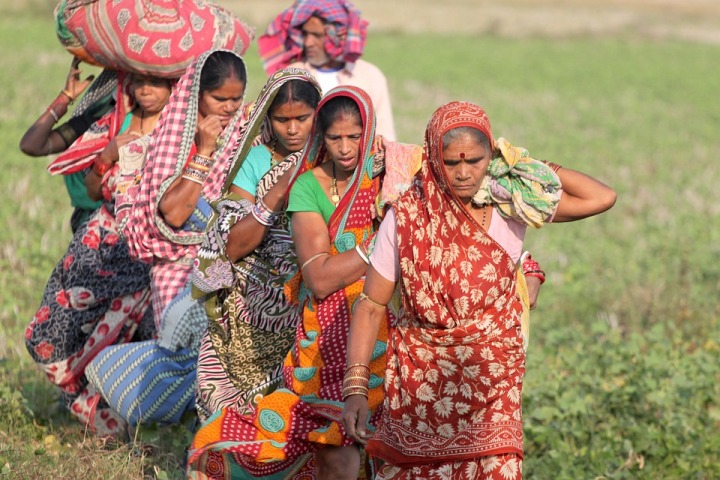Nepal’s Women Farmers Lead a Quiet Revolution Through World Bank’s REED Initiative
In Madhesh Province, Anjali Devi Yadav’s life once revolved around debt and uncertainty after her husband migrated to the UAE for work.

- Country:
- Nepal
Across Nepal’s hills and plains, a silent transformation is unfolding—one led by women who are turning their farms into thriving enterprises. Empowered by the World Bank’s Rural Enterprise and Economic Development (REED) project, thousands of women are shifting from subsistence farming to sustainable agribusiness, building not just livelihoods but independence, confidence, and resilience.
Launched to strengthen Nepal’s rural agribusiness ecosystem, REED provides grants, technical support, and access to markets for small-scale farmers, aligning with the country’s Agriculture Development Strategy. By linking farmers with buyers, cooperatives, and financial institutions, the initiative helps rural producers—especially women—move up the agricultural value chain and secure their economic future.
From Struggle to Self-Reliance: Anjali’s Journey
In Madhesh Province, Anjali Devi Yadav’s life once revolved around debt and uncertainty after her husband migrated to the UAE for work. But her fortunes changed when she joined a farmers’ cooperative supported by REED. A grant provided her with seeds, sprayers, farm tools, and training in modern agricultural practices.
Today, Anjali is a model of rural entrepreneurship. With improved productivity and reliable market access, she sold 9.8 tons of vegetables in 2024, earning Rs. 392,000—more than triple her previous income. She has even brought her husband back home, where he now earns more in the fields than he did abroad.
“Now, I don’t just grow vegetables. I grow confidence, security, and a future for my children,” Anjali says proudly.
Buffalo Farmers and Beekeepers Building a Sustainable Future
In Rolpa’s Madichour, farmers like Anisha Pun and Tirpani Baijali have turned dairy into a source of stability. “Earlier, the milk we produced didn’t find a market. Now we take it to the dairy,” Anisha explains. With REED’s support, they purchased high-yield Murrah buffaloes, improved animal husbandry, and established steady links with local buyers.
Similarly, in Panchthar district, a group of fifteen indigenous women from the Ngingma Chyanghthapu Chhyoling Women Farmers Group ventured into bee farming to reduce dependence on remittances. REED grants enabled them to acquire 38 modern beehives, protective gear, and technical assistance. Their newly branded “Himalayan Herbal Honey”, produced from medicinal plants like chiretta and wild chestnut, now sells at a premium price—proof that innovation and tradition can thrive together.
Goat Farming and Knowledge Sharing: Catalysts for Change
Knowledge has been a cornerstone of women’s empowerment in Nepal’s rural economy. In Sudurpashchim Province, Shanti Khadayat, chair of the Balanch Mahila Krishi Sahakari Sanstha, transformed her village’s goat-rearing practices by introducing Boer goats through a REED matching grant.
“It was a game changer,” she said. “Boer goat meat fetches a higher market price, and our goats are healthier and more productive.”
Her cooperative now trains other women in advanced animal husbandry, helping them improve breeding and farm management. Likewise, veterinarian Urmila Ghale leads another women’s group that received training to upgrade animal sheds and purchased Murrah buffaloes worth Rs. 189,000 through REED funding. Their cooperative now plans to export milk and organic compost to Indian markets, where demand and prices are higher.
Markets, Mentorship, and Mindset Shifts
For decades, Nepal’s farmers produced food for survival. But REED has shifted the focus from production to enterprise. According to Maha Ahmed, who leads the REED team at the World Bank, the key to success lies in connecting farmers to markets.
“Farmers have always produced, but thinking about the value chain wasn’t top of mind,” she explained. “Once you bring the market in, farming becomes a business.”
Buyers benefit too—gaining reliable supply chains, reduced transaction costs, and better coordination with producers. This partnership model creates stability for both sides, encouraging long-term collaboration.
Results That Speak for Themselves
Since its launch, REED has mobilized over $12.5 million in capital and generated more than 12,000 jobs across 171 municipalities and six provinces. Out of 8,738 direct beneficiaries, nearly 48% are women, and 108 of REED’s 300 productive partnerships are women-led.
The project’s success also comes despite requiring farmers to invest 50% upfront, a sign of their growing confidence. “It is comforting for rural farmers to realize they have a market and technical support,” Ahmed noted. “That warms up a risk-averse appetite.”
Women-led producer groups like Rana Samaj have already doubled their investments. “Our buyers always match market rates,” says Santoshi, a member. Another farmer, Kalpana, adds, “In cabbage alone, I earned Rs. 30,000 in one season. We are financially independent now and don’t rely on our husbands even for school expenses.”
Building Infrastructure for the Future
REED’s impact extends beyond direct beneficiaries. It has helped establish 74 Municipal Agricultural Livestock Service Centers (MALSCs)—fully equipped facilities that provide technical assistance, laboratory diagnostics, and training on disease control and livestock management. These centers are becoming crucial hubs for knowledge sharing and innovation.
Women at the Core of Nepal’s Agricultural Transformation
Women account for more than half of Nepal’s agricultural workforce, yet only 32% own land. The government aims to raise that to 50% by 2035, and initiatives like REED are key to achieving this goal.
By connecting women to finance, training, and markets, REED is fostering a new generation of agri-entrepreneurs who are redefining what rural success looks like. Through collective action and inclusive policies, Nepal’s women farmers are not only transforming their lives but also contributing to the nation’s economic growth, food security, and gender equality.
From the honey producers of Panchthar to the vegetable growers of Madhesh and the dairy farmers of Rolpa, Nepal’s women are proving that with the right tools and opportunities, they can lead the charge toward a more resilient and sustainable agricultural future.
ALSO READ
EF Polymer Secures Series B Funding to Transform Agriculture
Tamil Nadu's GI Tag Triumph: Traditional Crafts and Agriculture Shine
AI Revolutionizing Maharashtra's Agriculture and Society
Mizoram's Call to Action: Empowering Youth Through Education and Entrepreneurship
Revolutionizing Agriculture: Andhra Pradesh's Vision for 'Rythu Bazaars'










